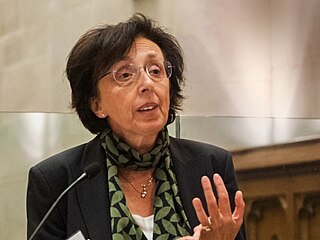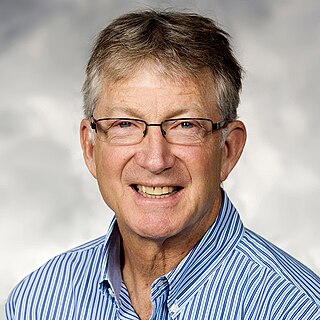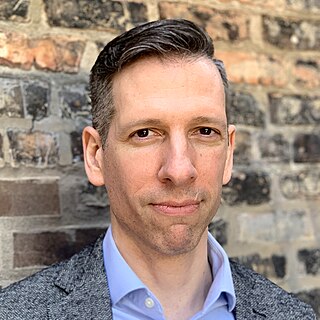
The University of Chicago is a private research university in Chicago, Illinois, United States. Its main campus is in the Hyde Park neighborhood on Chicago's South Side, near the shore of Lake Michigan about 7 miles (11 km) from the Loop.

Argonne National Laboratory is a federally funded research and development center in Lemont, Illinois, United States. Founded in 1946, the laboratory is owned by the United States Department of Energy and administered by UChicago Argonne LLC of the University of Chicago. The facility is the largest national laboratory in the Midwest.

Armand Paul Alivisatos is a Greek-American chemist and academic administrator who has served as the 14th president of the University of Chicago since September 2021. He is a pioneer in nanomaterials development and an authority on the fabrication of nanocrystals and their use in biomedical and renewable energy applications. He was ranked fifth among the world's top 100 chemists for the period 2000–2010 in the list released by Thomson Reuters.

David D. Awschalom is an American condensed matter experimental physicist. He is best known for his work in spintronics in semiconductors.

Robert Jeffrey Zimmer was an American mathematician and academic administrator. From 2006 until 2021, he served as the 13th president of the University of Chicago and as the Chair of the Board for Argonne National Lab, Fermi National Accelerator Laboratory, and the Marine Biological Laboratory. He then served as chancellor of the University of Chicago until July 2022. As a mathematician, Zimmer specialized in geometry, particularly ergodic theory, Lie groups, and differential geometry.

The University of Chicago Medical Center is a nationally ranked academic medical center located in Hyde Park on the South Side of Chicago. It is the flagship campus for The University of Chicago Medicine system and was established in 1898. Affiliated with and located on The University of Chicago campus, it also serves as the teaching hospital for Pritzker School of Medicine. Primary medical facilities on campus include the Center for Care and Discovery, Bernard A. Mitchell Hospital, and Comer Children's Hospital.

Thomas Felix Rosenbaum is an American condensed matter physicist, professor of physics, and the current president of the California Institute of Technology (Caltech). Previously, Rosenbaum served as a faculty member and Provost of the University of Chicago. He has also served as the vice president for research at Argonne National Laboratory.
Melody A. Swartz is a professor and vice dean for faculty affairs at the University of Chicago who pioneered research in engineering complex tissues. Her most cited work "Capturing complex 3D tissue physiology in vitro" has been cited over 1784 times. Her research is focused on understanding the role of the lymphatic system regulating immunity in homeostasis and diseases, particularly cancer. She was previously director of the Institute of Bioengineering at the École Polytechnique Fédérale de Lausanne. She was elected to the National Academy of Engineering in 2023, the Royal Academy of Medicine of Belgium in 2023, and the National Academy of Medicine in 2020.

Valerie Elaine Taylor is an American computer scientist who is the director of the Mathematics and Computer Science Division of Argonne National Laboratory in Illinois. Her research includes topics such as performance analysis, power analysis, and resiliency. She is known for her work on "Prophesy," described as "a database used to collect and analyze data to predict the performance on different applications on parallel systems."

Juan J. de Pablo, a chemical engineer, is the executive dean of the New York University Tandon School of Engineering and the University’s inaugural executive vice president for global science and technology. He assumed those posts on October 1, 2024. Prior to that, he was Liew Family professor in the Pritzker School of Molecular Engineering at the University of Chicago and has served as senior scientist at Argonne National Laboratory. In 2018, he was appointed Vice President for National Laboratories at the University of Chicago, a title which later expanded to include Science Strategy, Innovation and Global Initiatives in 2020. In 2021, he became Executive Vice President for Science, Innovation, National Laboratories and Global Initiatives at the University of Chicago. He is known for his research on the thermophysical properties of soft materials and was the co-director of the NIST supported Center for Hierarchical Materials Design (CHIMaD). and director of the UW-Madison Materials Research Science and Engineering Center (MRSEC). He was elected a member of the National Academy of Sciences in 2022.

Matthew V. Tirrell is an American chemical engineer. In 2011 he became the founding Pritzker Director and dean of the Institute for Molecular Engineering at the University of Chicago in addition to serving as senior scientist at Argonne National Laboratory. Tirrell's research specializes in the manipulation and measurement of polymer surface properties, polyelectrolyte complexation, and biomedical nanoparticles.

Giulia Galli is a condensed-matter physicist. She is the Liew Family Professor of Electronic Structure and Simulations in the Pritzker School of Molecular Engineering and the department of chemistry at the University of Chicago and senior scientist at Argonne National Laboratory. She is also the director of the Midwest Integrated Center for Computational Materials. She is recognized for her contributions to the fields of computational condensed-matter, materials science, and nanoscience, most notably first principles simulations of materials and liquids, in particular materials for energy, properties of water, and excited state phenomena.
Nadya Mason is dean of the Pritzker School of Molecular Engineering at The University of Chicago, receiving that appointment in October 2023. Prior to joining The University of Chicago, she was the Rosalyn Sussman Yalow Professor of Physics at the University of Illinois at Urbana-Champaign. As a condensed matter experimentalist, she works on the quantum limits of low-dimensional systems. Mason was the Director of the Illinois Materials Research Science and Engineering Center (I-MRSEC), and Director of the Beckman Institute for Advanced Science and Technology from September 2022 through September 2023. She was the first woman and woman of color to work as the director at the institute. In 2021, she was elected to the National Academy of Sciences.

Laura Gagliardi is an Italian theoretical and computational chemist and the Richard and Kathy Leventhal Professor of Chemistry and Molecular Engineering at the University of Chicago. She is known for her work on the development of electronic structure methods and their use for understanding complex chemical systems.

James L. Skinner is an American theoretical chemist. He is the Joseph O. and Elizabeth S. Hirschfelder Professor Emeritus at the University Wisconsin-Madison. Until 2024 he was a member of the Scientific Advisory Board of the Welch Foundation. Until 2020, Skinner was the Crown Family Professor of Molecular Engineering, professor of chemistry, director of the Water Research Initiative and deputy dean for faculty affairs of the Pritzker School of Molecular Engineering at the University of Chicago. Skinner is recognized for his contributions to the fields of theoretical chemistry, nonequilibrium statistical mechanics, linear and nonlinear spectroscopy of liquids, amorphous and crystalline solids, surfaces, proteins, and supercritical fluids. Skinner is the co-author of over 230 peer-reviewed research articles.

Ying Shirley Meng is a Singaporean-American materials scientist and academic. She is a professor at the Pritzker School of Molecular Engineering at the University of Chicago and Argonne Collaborative Center for Energy Storage Science (ACCESS) chief scientist at Argonne National Laboratory. Meng is the author and co-author of more than 300 peer-reviewed journal articles, two book chapter and six patents. She serves on the executive committee for battery division at the Electrochemical Society and she is the Editor-in-Chief for MRS Energy & Sustainability.

Seth B. Darling is the Chief Science & Technology Officer of the Advanced Energy Technologies Directorate at Argonne National Laboratory. He previously served as director of the Center for Molecular Engineering, a research and development organization partnered with the University of Chicago focusing on advanced materials for cleaning water, quantum information science, and polymer science. Darling is also a senior scientist at both the U.S. Department of Energy’s (DOE) Argonne National Laboratory and the University of Chicago’s Pritzker School of Molecular Engineering. He also directs the Advanced Materials for Energy-Water Systems (AMEWS) Center, a DOE Energy Frontier Research Center formed in 2018.
Jeffrey Alan Hubbell is an American bioengineer working immunoengineering. His research has focused on topics from physical biology, biomaterials, regenerative medicine, and translational immunology.
Paul Franklin Nealey is an American molecular engineer.
Stuart J. Rowan is a Scottish chemist.














